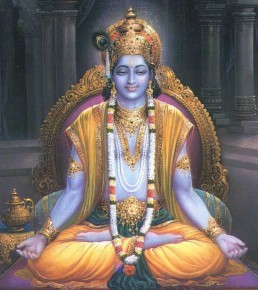Swami Chinmayananda
Swami Chinmayananda Commentary
In the previous stanzas we found that action belongs to the realm of matter, no doubt IN THE PRESENCE of the Spirit. Failing to discriminate thus between the equipments of action and the actionless Spirit, which, in an unhealthy combination between them, comes to manifest as the “actor” (doer), the poor ego-centric personality so born comes to pant and sigh at its own disappointments and failures, or dances and jumps at its own joys and successes. The moment an individual becomes aware of these inner mechanisms and their play, the delusory ego-centric individuality ends as it becomes a mere myth of the mind, a delusory phantom of a midsummer, mid-day dream.
THIS BEING THE CASE (Tatra evam sati) — In all such actions, whether good or bad, as undertaken by the body, speech or mind, the essential component parts are the body, ego, organs-of-perception, organs-of-action and the elements; thus all actions belong to matter. But the Spirit, which is the essential nature, in identifying Itself with the matter-vestures, comes to live through the disturbing destinies as the ever-changing man. All pangs and joys, all failures and successes, all imperfections and impediments, belong to the ego, which is the Spirit considering Itself as conditioned by these components of action. The Supreme Pure Self (Kevalam Aatmaanam) is misunderstood by the ordinary man to be the actor (Kartaaram), and in the consequent ego-sense, the divinity is forgotten and the individual comes to despair. The causes of this misunderstanding have been indicated here. Untempered reason (Akrita Buddhi) and perverted mind (Durmati) are the maladjustments in an individual, because of which, right recognition of one’s own divinity is not constantly maintained within. The implication of the statement is that, if a seeker can integrate himself — through the process of disciplining his reasoning faculty and guiding his mind away from his intellectual perversities — that individual will come to experience within himself that it is only the five-fold components made up of matter that are indulging in the agitations of the outer activity.
ELUCIDATING THE FOREGOING IDEAS MORE VIVIDLY, THE LORD CONTINUES:
Adi Sankara Commentary
Tatra is used for connecting with the topic under discussion. Tatra evam sati, this being the case, when actions are thus accomplished by the five causes mentioned above;-this portion has to be connected with ‘perverted intellect’ by way of causality [Actions are done by the body etc., but since a person thinks that the Self is the agent, therefore he is said to have a perverted intellect.]-yah, tu, anyone, an unenlightened person, who; pasyati, perceives; kevalam, the absolute, pure; atmanam, Self; as the kartaram, agent-thinking, ‘I myself am the agent of the actions being done by them’, as a consequence of imagining the Self as identified with them; why?-akrta-buddhitvat, owing to the imperfection of his intellect, owing to his intellect not having been refined by the instructions of Vedanta and the teachers, and by reasoning-. Even the person who, believing in the Self as distinct from the body etc., looks upon the distinct [Ast. omits anyam (distinct).-Tr.], absolute Self as the agent, he, too, is surely of imperfect intellect. Hence, owing to his having an imperfect intellect, sah, that man; na, does not; pasyati, perceive (properly) either the truth about the Self or about actions. This is the meaning. Therefore he is a durmatih, man of perverted intellect, in the sense that his intellect is contemptible, perverse, corrupted, and the cause of repeatedly undergoing births and deaths. He does not perceive even while seeing-like the man suffering from Timira seeing many moons, or like one thinking the moon to be moving when (actually) the clouds are moving, or like the one seated on some conveyance (e.g. palanquin), thinking oneself to be moving when others (the bearers) are moving. Who, again, is the man of right intellect who perceives correctly? This is being answered:
The Bhagavad Gita with the commentary of Sri Sankaracharya – Translated by Alladi Mahadeva Sastry
Holy Geeta – Commentary by Swami Chinmayananda
The Bhagavad Gita by Eknath Easwaran – Best selling translation of the Bhagavad Gita
The Bhagavad Gita – Translation and Commentary by Swami Sivananda
Bhagavad Gita – Translation and Commentary by Bhaktivedanta Swami Prabupadha
Srimad Bhagavad Gita Chapter 18 – Verse 16 – 18.16 tatraivam sati – All Bhagavad Gita (Geeta) Verses in Sanskrit, English, Transliteration, Word Meaning, Translation, Audio, Shankara Bhashya, Adi Sankaracharya Commentary and Links to Videos by Swami Chinmayananda and others – 18-16

